by Jenny Rose | Dec 28, 2017 | Connection & Community, Emotional Intelligence
Character: The mental and moral qualities distinctive to an individual; a person in a novel, play or movie.

Photo by Nick Grappone on Unsplash
I’m fascinated with the places between. All the places between. Threshold places. Edge-of-chaos places. Here-there-be-dragons places off the edges of maps. It’s in the gaps, fissures, cracks and edges that I mine for the characters that inhabit my writing. It’s in the between places my own character is shaped, and I gain the clearest understanding of the characters around me.
I’ve written about labels before. Discovering characters is not about labels. Labels aren’t people. We’ve had a lot of reminders recently that talent, success, money and power fail to fully define character. Ours is a culture of texts and tweets, acronyms and jargon like “neoliberal” and “postmodernism.” We’ve become skilled at reducing ourselves and others to one-dimensional paper dolls with the application of a label. It’s an all-or-nothing kind of culture. We’ve no time or interest to invest in understanding complexity.
But what lies between the enormously talented actor and his serial sexually abusive behavior? What is the untold story of the “perfect” mother who drives into a lake with her kids in an act of murder and self-destruction? How do we think about the extraordinarily gifted writer who is also homophobic, or a child abuser? Who are we in the gap between what we believe ourselves to be, what we define ourselves to be, what we want ourselves to be, what we’re afraid we are, and how we actually show up in the world in the experience of others?
In that space between lies real character. That’s where I’m at work, listening, taking notes, asking questions and observing. As a writer, I must know my characters. What are they afraid of? What’s their worst memory? What’s their ideal vacation? What motivates them? What does their sock drawer look like? What’s in their car? What’s on their desk? How do they treat a service person? How many unopened emails squat in their inbox? Where do they want to be in five years? In ten years?
Defining ourselves or others by a single characteristic, choice or ideology doesn’t build connection, understanding or empathy. We can spend hours online, commenting, facebooking, blogging and interacting with others about every issue from sexual politics to diet, but none of it defines our character as honestly as how we treat a real live co-worker who identifies as transgender, or what kind of food we actually have in our refrigerator.
Those tantalizing, fertile, often concealed places between! Interestingly, words obscure the places between. Words are capable of seductive lies, but action, especially action taken in the stress of an unexpected moment, points unfailingly to true character.
Another problem with labels is their inflexibility. We each perform hundreds and hundreds of actions a day, and some are notable for how well they don’t work out. Labels imply we don’t change, we don’t grow, we don’t adapt and adjust and learn, when in fact the opposite is true.
 The Johari Window is a concept created by a couple of psychologists in the 1950s to help people understand their relationships with themselves and others. The window suggests that we cannot see ourselves or others entirely; there is always a space of possibility to discover. Fully defining character becomes a community project. Even so, the unknown or hidden parts of character can and do appear suddenly and overwhelmingly, often resulting in some kind of heinous act and leaving us struggling with what we missed, what we didn’t know or what we didn’t want to admit.
The Johari Window is a concept created by a couple of psychologists in the 1950s to help people understand their relationships with themselves and others. The window suggests that we cannot see ourselves or others entirely; there is always a space of possibility to discover. Fully defining character becomes a community project. Even so, the unknown or hidden parts of character can and do appear suddenly and overwhelmingly, often resulting in some kind of heinous act and leaving us struggling with what we missed, what we didn’t know or what we didn’t want to admit.
It’s so fatally easy to misunderstand and underestimate others, especially when we can’t observe, talk and interact face-to-face with someone and compare their actions with their words over the long term. Complexity takes time. Making judgements based on labels does not.
As a writer, I’ve learned to look at myself and others with a more interested and less judgmental eye. I’ve learned to set up camp in the places between, look and listen carefully, observe keenly and ask a lot of questions. I’ve concluded that people who toss labels around are often in too much of a hurry to achieve power over others and silence challenge or dissent to engage in thoughtful dialog or discussion. Label users reveal far more about themselves than whoever they’re labeling. It’s a diversionary tactic.
Who is that character hiding behind all the labels they’re slinging left, right and center? What’s really going on with them? What kind of fear, uncertainty, insecurity, pain or lust for power motivates them? Who taught them to use labels so carelessly and unhelpfully? What needs are they trying to meet?
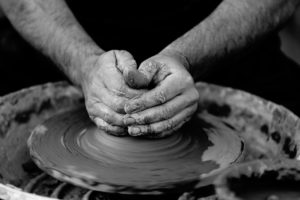
Photo by Quino Al on Unsplash
An engaging character is one who defies labels, one who challenges preconceptions, one we empathize with and even care about in spite of the abhorrent choices they make. A well-written character is complex and dynamic.
This week is one of those between places. We’re swinging between Christmas and the New Year, between 2017 and 2018. The holiday season has stirred up our memories, our family situations, our grief, gratitude, and financial fears. We’ve traveled, abandoned our usual diet and routines, gotten worn out and indulged in sugar and alcohol. The flu is abroad. The package was stolen off the porch. The dog bit Santa when he came down the chimney.
Here, my friends, is the between place of authentic character. Not who we wish to be. Not who we say we are. Not who we present ourselves as on Facebook or pretend to be for our families and coworkers or resolve to become in the New Year, but who we are today, with our blind spots, our secrets, our fears, our greasy oven, our favorite coffee cup, indigestion, bills to pay, snow to shovel, our comfy sagging chair and what we choose to do with this in-between time.
Powerful characters. May we create them. May we discover, foster and celebrate them in others. May we honor our own.
All content on this site ©2017
Jennifer Rose
except where otherwise noted
by Jenny Rose | Dec 21, 2017 | A Flourishing Woman, The Journey
Yule, the winter solstice, is upon us once again. This year, here in the deeps of darkness, I’m thinking about The Fool’s journey.
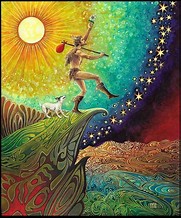
The Fool, by Emily Balivet
The Fool is an archetype, a recurrent symbol in mythology, folklore and story. Jack of Jack and the Beanstalk is a Fool. The Fool shows up as a simpleton, an innocent, one who is ignorant, inexperienced and silly. Archetypes have two sides, shadow and light. In modern culture The Fool has been reduced to its shadow, its most negative attributes, an insult, a curse and a contemptuous label.
But the old tales hint at a deeper, older meaning of the archetype. In fairy tales, The Fool is often the youngest sibling, the least able and powerful character, who nevertheless becomes the only one to successfully complete the task or quest. Often, The Fool has a good heart, or some extraordinary purity of character that allows him/her to be successful. The Fool has faith in magic, in talking birds and beasts, in the advice of old women, in objects given by peddlers at crossroads. To be a fool is to be held in a circle containing everything and nothing, to be without judgement, rules, expectations, cynicism or fear. The Fool is an archetype of youthful energy, bright, glowing and optimistic, filled with hopes and dreams.
Characters of this archetype set out, sometimes exiled or driven from their home, sometimes volunteering to go, with nothing but their shining confidence, intuition and willingness to do a task or find a solution. They rarely have external resource, but carry a great wealth of internal assets, including, interestingly, a kind of innocent cleverness that arises from authenticity and the simplicity of great integrity. The Fool has everything she or he needs in the form of untapped, chaotic potential.
It seems to me we’ve lost sight of the sacred role of The Fool. We kill foolish behavior with punishment, restriction, control, mocking and tribal shaming. We teach our children to avoid playing The Fool by making “good” choices. We avoid looking or feeling like fools. Foolishness is equated with immaturity, irresponsibility and naiveté. We resist being wrong or admitting we made a mistake. Playfulness is no longer a priority.
I see The Fool as an essential first step in The Hero’s journey. It’s where we all start as we undertake any new experience or endeavor. All Heroes start out as Fools, and perhaps all Fools are also Heroes. The Fool archetype creates space in which we learn resilience, strength, courage and creative problem solving. In the gap between The Fool’s happy hopes and dreams and reality is the place where Self is shaped, and the more fully we embrace this archetype, the more of our own potential we realize.
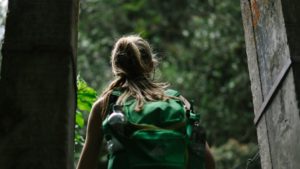
Photo by Dan Gold on Unsplash
That’s what I believe, when I think carefully about it, but that’s not how I show up in the world.
I hate to feel like a fool. Humiliation is one of the most uncomfortable emotions I experience. I dread appearing irresponsible or naïve. I’ve bought into the cultural definition of foolishness equaling stupidity, and I don’t want to be perceived as stupid. I’ve been warned at the beginning of every Fool’s journey I’ve embarked upon with head shaking, patronizing smiles and dire, ominous warnings: “You have no idea how hard marriage is.” “Boy, is your life going to change!” “You’re going to hate it!” “You’ll find out I was right!” “It won’t last.” “Nothing will ever be the same.”
As a parent, I shook my own head, smiled patronizingly and issued warnings. I wanted to protect my sons from “bad” choices, from danger, from illness and injury and from the pain of disillusionment and disappointment, the very things that help us figure out who we are.
The Fool is an archetype precisely because it’s so persistent and present in our lives. It’s our nature to go into the world and explore, seek, complete tasks and engage in quests. I wonder what it would be like if we all framed The Fool’s journey as sacred space, as a necessary and beautiful rite of passage, filled with potential and promise. In that case, revisiting this archetype throughout our lives at any age could be viewed as a chance to refresh our willingness, consent and curiosity about ourselves and what might be possible, a chance to apply the skills we’ve learned in our previous cycles as The Fool rather than stay frozen in bitterness, shame, regret and fear.
It’s true that every new journey is a risk. None of us could have imagined what it would be like to be an adult, to fall in love, to get married, to have children, to move across the country, to get the perfect job, to battle illness or injury, to age. Dire warnings and ominous predictions are pointless and useless as we navigate in our lives. Sincere and simple congratulations from others; faith in our own intuition, intelligence and strength and the experience of unconditional love and belief in our abilities from friends and family is what we need as we push forward in search of new horizons.
Yule signals the return of the light and new beginnings. We all embark on a new cycle, and none of us knows what it will bring. The Fool is tying together a bundle of food and setting out, following a new road into an unknown place, exploring, perhaps searching for something. Interested, curious, fearless and confident, The Fool walks into the future as the light strengthens once more.

Photo by yatharth roy vibhakar on Unsplash
All content on this site ©2017
Jennifer Rose
except where otherwise noted
by Jenny Rose | Dec 14, 2017 | Authenticity, Emotional Intelligence, Needs
It occurred to me this morning that, in general, I’m still confused about what I want.
I’ve had a tumultuous history with my own wants. At some point, very early, as I was learning to be a people pleaser, I gave up wanting anything because I thought it was bad. What I understood was that everyone else’s wants were far more important, and it was my more-than-full-time job to provide those wants rather than selfishly have my own. With rare exceptions, that’s been my modus operandi my whole life.
When I went through a life coaching and emotional intelligence program, my coach suggested I had a perfect right to get my needs met, and he defined some of my “wants” as needs, for example my longing for community and connection. I was enraged. Nobody had ever before made such an outrageous proposal. He clearly didn’t understand the terrible vulnerability of needing or wanting anything from anyone. Having the right to get needs and wants met was the most ludicrous, dangerous piece of heresy I’d ever heard.
That was four years ago, and I’m as angry about it now as I was the first time I heard it.
I also can’t leave the idea alone. I think about it all the time.

Photo by John Salvino on Unsplash
I picture my needs and wants as a snarling chained wolf with blazing eyes, nothing but matted grey hair over bones, backed into a tight corner, determined to go down fighting.
I grieve, literally, to admit I chained it there myself. I chained it without food, water or shelter, and walked away — for decades. During those years of neglect, it starved and thirsted. It suffered alone with no help, no hope, a solitary prisoner.
I’ve done a lot of animal rescue work in my time, and I know sometimes an animal is just too far gone to rehabilitate. Sometimes you can save their bodies, but the abuse and neglect they’ve suffered has damaged their will to live and their ability to trust and connect, and rescue comes too late. Sometimes, against all odds, some strength of heart or spirit survives and an animal accepts affection and care, but its body is too starved or broken to heal.
Part of what I’ve been doing since I’ve come to Maine is to try to rescue my chained wolf, this piece of self I rejected, denied and tried to destroy.
It’s a long process, filled with grief, shame and anger. It takes determination, patience, and the willingness to own my history, my pain and my choices, as well as consenting to my responsibility for my own self-healing. Overcoming internal taboos is desperately hard work, and Wanting is one of my oldest taboos.
Sometime last year I wrote a list titled “Things to Want.” It was short and consisted of necessities, mostly. After a lot of hesitation, I added two things that were not necessary but I just … wanted. It felt wrong. It felt shameful. I left the list on my desk and over the following days and weeks I looked at it as I went about my life. About eight months later I bought one of the unnecessary things, a perfumed body oil I love. It cost about $25.
It was like offering a little bit of bland food to my starving wolf, pushing it near with a stick so as to avoid getting mauled. Not so much food as to make it sick, but a place to start.

Photo by Arun Kuchibhotla on Unsplash
This morning, in the pause of winter and our first big snowstorm, my partner and I talked about our plans, our dreams, and our progress. Later, I went out to walk in the snow and I suddenly saw another layer to wanting, another step closer to making amends to my chained wolf.
Wanting is just the beginning. Making a Christmas list is only the top step. What’s the list under the Christmas list, and the list under that? What is it I really want, independent of anyone else? What about the dreams I hold in common with no one, that are just about and for me? If I was free — If my wolf could bound through the snowy landscape and disappear into the Yule forest — what would I want? If we could escape judgement, our own and others’; escape for a moment our stories and labels and self-definitions; escape family, social and tribal expectations; escape our ideology (most imprisoning of all) and want, honestly, nakedly, with all our hearts, what would that Christmas list look like?
In other words, it’s not about the perfumed body oil (Aphrodisian Fire, by the way, from Kate’s Magik). It’s about touch, scent and caring for my thinning skin. It’s about deliberately honoring my own feminine sensuality.
I don’t need any particular product, cosmetic, clothing, gizmo or piece of technology in order to honor my own feminine sensuality, although there are plenty of things to buy that might support that want, including Aphrodisian Fire, but I see now those are really just symbols. I have the power to honor my sensuality in the way I live — in the choices I make about who I connect with and how, and how I treat myself.

Photo by Caley Dimmock on Unsplash
Santa hasn’t got my choices in his sleigh.
I’m very attached to the dreams my partner and I hold in common. I love our vision, and I’m invested in it. It’s going to take a lot of money, and we don’t have that right now.
Maybe we won’t ever have it.
Maybe I was a damn fool (again) and I should never, never, have listened to someone who says it’s okay to have needs and want them met. Maybe I should walk away from my wolf again, and this time never come back. Let it starve to death.
But maybe our grand vision and plans are only the top layers of what I really want. Maybe the plan is the wrapping paper around the real treasures of self-reliance; living as part of a complex, self-sustaining system; building independence from the energy grid and a culture I largely can’t support; fostering community and trusting in my greatest joy … writing.
I don’t have to wait for the plan to happen to have those things. I don’t need money. I don’t need to wait for someone else. I don’t need to brutally imprison or eliminate my wants and needs. I can be learning, building and transforming my life right now, today, from the inside out. I can, day by day, draw a step closer to my wolf with food, with water, with a gentle hand and with compassion, and maybe, one day, come close enough to remove the chain and let the poor creature go free and wild into the world, wanting and needing as it will.
So, I’m making a list and checking it twice. Or three times. I’m peering underneath the items, things, objects, stuff on that list. What is it I really want? What am I really longing for? And if I look under that, what do I find? What are the deepest wants and needs?
Merry Christmas, everyone.

Photo by Galina N on Unsplash
All content on this site ©2017
Jennifer Rose
except where otherwise noted
by Jenny Rose | Dec 7, 2017 | A Flourishing Woman, Mind
Scrying is “the practice of looking into a suitable medium in the hope of detecting significant messages or visions.” (Wikipedia)
My laptop has developed the Technical Flu and is in the shop. I’m chagrined to discover how much I depend on it. It’s the only portable device I have, as I still resist the pressure to obtain even a cell phone. Suddenly, my access to music, DVDs and the Internet is restricted. I know, it’s a first world problem, but I’m not complaining. I whined for the first few days, but as I sit down to write this post what I mostly feel is a kind of grateful wonder.
In my laptop’s absence I find a lot of quiet. Without my usual entertainment and distraction, my ears, eyes and attention are freed. As I work on the second book of my series, I’ve picked up a sketch pad and colored pencils in order to create a map of my very complex world where the myth, fairy tale and oral history of several cultures meet and interact. Without access to my one-dimensional outline on my word processor, I recognize the need for a two or even three-dimensional model to truly show all the connections and correspondences of the series. I’ve discovered new depths to my creative vision and work and considered new ways to approach it.

Photo by Ludde Lorentz on Unsplash
Folk and fairy tales often speak of depths. Caves, tunnels, wells and stairways descend to other places, magical underground kingdoms where evil beings lurk and flex their destructive forces and unexpected but powerful animals or crones or fairies save the hero or heroine. Gypsies, oracles, shamans and seers scry crystal balls or pools of water, smoke, fire, mirrors or stones. Runes whisper messages. Tarot cards reveal enigmatic insight.
We are in the depths of seasonal darkness now. In two weeks the light begins to return. Here in Maine the day starts to fade at 3:30 in the afternoon and an hour later it’s full dark. What do the depths of darkness hold? What lies between the stars? What dreams unfold behind our eyelids during the long sleeping hours? What lives, hunts and dies in the winter-bare forests under the moon? What stirs in the dark sea’s deeps?
If we could separate ourselves and all those around us from our tech and toys, if we could all free our eyes from the screen and our ears from the noise and look, clear-eyed and undistracted, at those around us, what would we see in one another? If we were forced to sit quietly at a window with nothing but a chair for company, what might we discover in the world around us? If we stand naked and alone in front of a mirror and look into our own eyes, what looks back at us?
What lies in the depths of longing and loss? What lies denied and amputated in the deeps of a soul? What waits to be rediscovered or reclaimed, healed or released?
Some of the deepest, darkest, coldest and most fearsome depths in my life turned out to be only ankle-deep after all. Ankle deep and unpleasant, but, once challenged and understood, pathetic and sad rather than powerful and terrible. Shallows pretending to be depths. A leech or two instead of a sea monster.
Other shallows are so seductive, so enticing, so shiny, that we joyously bare our feet and run into them, gradually wading farther and farther from shore, our attention captured, our gaze fixed on their captivating surface, and there we stay until we die.
All my life I’ve been told I’m too intense. I’ve never known exactly what that means, and the criticism never fails to both hurt and irritate, especially as I can’t get more information. Asking probing questions is simply an example of my obnoxious intensity, it appears.
I wonder this morning if what people are expressing is discomfort with my love for the depths, for the dark where miracles happen, for the hidden thing, be it dreadful or dazzling. Questioning is falling out of social favor. Political correctness shackles and gags us. The shiny shallows are the place to be, where text messages, emojis and ‘likes’ glitter and frolic and algorithms and ideology teach us what to think, believe, value and buy.

Photo by Ryan Hutton on Unsplash
I can be seduced by the shallows as well as anyone, and have several times been fooled by them, but somewhere inside me resides a wild thing, a female creature that glories in the power of the dark and deep and always returns to passion, emotion, and creativity. I want to dive into the night sky and swim naked among the stars and nebulae. I want to see and be seen, hear and be heard, know and be known. I navigate with a mouthful of questions and an insatiable curiosity. I don’t want life to be pretty and distracting and shiny. I don’t want all my dreams to be sunlit and filled with flowers and kittens.
I want life to be as it is, smelling of musk and blood and starlight, dark and powerful and magnificent beyond my puny imagination. I want the hot eroticism of life and the torn flesh of death. I want to embrace the unknowable, kiss the lips of mystery and reclaim and wield the full power of my fear.
I choose to live in the depths.
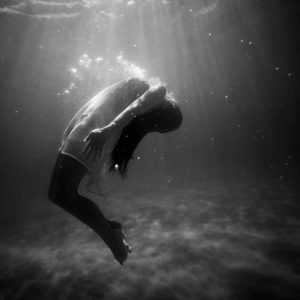
Photo by Christopher Campbell on Unsplash
All content on this site ©2017
Jennifer Rose
except where otherwise noted
by Jenny Rose | Dec 1, 2017 | A Flourishing Woman, Self-Love
Relationship is the finest crucible I know for personal growth and transformation. Unfortunately, it’s also the best crucible for abuse and destruction, but I no longer focus on that aspect of connection with others. My relationships now are based on growth, not destruction. I have promised myself this.
As my partner and I slowly move toward shaping a life of self-sufficiency and holistic collaboration with our land and community, we are experiencing (naturally) many unwelcome pauses and fallow periods as we wait on favorable weather, the scheduling needs of others or the availability of funds.
I’ve noticed during these frustrating pauses my partner serenely deals with the work of the day and then is perfectly happy to sit on our sagging couch, a book in one hand, the TV remote in the other and the cat velcroed to him, occasionally getting up to feed the wood stove.
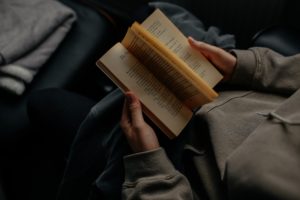
Photo by Lilly Rum on Unsplash
It drives me nuts. How does he do that?
We had a conversation about it over breakfast recently.
He’s hanging out and waiting for the stars to align so we can begin to move forward again. That might come in the form of some income, a phone call, a stretch of really warm days, or who knows what other miracles. He figures it will all work out, one way or another, in time, and meanwhile he might as well relax and enjoy life.
I, on the other hand, from my earliest memory, make Deals with the Universe. My Deal is that I’ll Be Good in order to get what I need to survive. Being Good is specifically defined.
- I will not complain, whine, want or need anything I don’t have.
- I will hoard what I do have and be grateful, because I have so much more than many others.
- I will work as hard as I can at all the tasks that can be done right here, right now, even if it’s only scrubbing the kitchen floor on my hands and knees or cleaning out closets.
- I will not wait, hope, dream. I will act. Now!
- I will not make excuses, procrastinate or (God help us) relax.
- I will never admit to feeling afraid or anxious or impoverished in any way. Being truthful about our experience is “airing dirty laundry,” which is shameful and vulgar.
Somewhere inside me is a hysteric who knows my partner is wrong. Sitting on the couch means he’ll never see his dreams come true. He won’t deserve to see dreams come true, because he’s not doing anything to help himself, to prove himself worthy of good things. He’s not hoarding what we have. He’s got a light on for reading and the TV on and he’s putting wood in the stove as though those six cords out in the barn will last all winter! (They will.) He’s not doing all the tasks that could be done. He’s failing the test, failing his side of the deal, and we are screwed.
All this panic and fear impel me to work harder and harder at everything. At anything. I must demonstrate to the Universe that I’m not a slacker, a sponge, an ingrate. I must also make up for his blasphemy of sitting on the couch, because we hold dreams in common, and we can’t manifest the lives we want without each other. Clearly, I must Be Good for both of us.
The infuriating but inescapable truth is that I can’t honestly say my Deals with the Universe work better than my partner’s approach. I’ve always had what I’ve needed to survive, but so has he!
It’s not fair.
Then, this last week I read the best essay I’ve come across on rape culture and its effect on women. The writer perfectly expresses much of my longing and the difficulty of allowing oneself to be fully and powerfully female. I feel more and more tension around this in our climate of hysterical political correctness, labeling, jargon and sloppy thinking. The increasing visibility of symptoms of rape culture give me hope that in some quarters there is a will to change, but will it be enough? Will we ever really see an equal playing ground for all people? Not necessarily the same playing ground, but equal in contribution and value, equal in respect, resource and power?
I don’t know.
Anyway, I went for my morning walk with the essay on rape culture and my Being Good rules rattling around in my head. There were snowflakes in the air under a mostly cloudy cold sky with occasional gleams of sun. The river flowed quietly along and I sat for a while under the trees to watch the snow fall in the water.
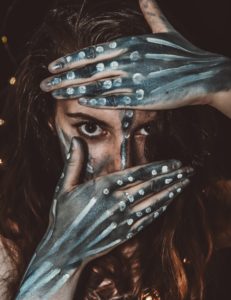
Photo by Joshua Fuller on Unsplash
What if, I wondered, instead of my exhausting and not-notably-effective list of what Being Good entails, I changed my Being Good Deal with the Universe to living the truest and fullest expression of myself possible? What if that included the entirety of my wants, needs, feelings, thoughts, creativity, passion, power and sexuality? What if that included all the great and small activities and experiences that give me pleasure? What if I gave my obnoxious, persistent and compulsive judgement a sabbatical, with an option for permanent retirement?
I was so intrigued by this that I’ve been playing with it for the last few days. In that time my laptop developed technical problems and is in the shop, so I’ve been without my usual habits, tools and routines. This post was not published first thing Thursday morning. I notice that life manages to continue in spite of it. I’ve read, walked, laid on my back on the ground in the sun, meditated, gone swimming and luxuriated in a hot therapy pool, done Tai Chi and ordered my favorite body oil. I’ve listened to Christmas music. I’ve eaten a bowl of ice cream. I’ve had an honest conversation with two women I like and admire. I’ve taken walks with my partner. This looks much like my usual life, it’s just that currently I’m allowing myself to enjoy my experience without shame, expectation or judgement.
Life is a lot easier and much more fun under my new (and simplified) Be Good Deal with the Universe. Will the Universe frown or smile upon this new Deal?
Who knows? Maybe it’s none of my business. Maybe the Universe isn’t looking over my shoulder, recording every action and thought, maintaining a cosmic scorecard. Maybe the Universe is sitting on the couch, alternately reading science fiction and watching reruns of Star Trek on Syfy and paying absolutely no attention to me whatsoever, and all my frenzied flapping around is just a waste of energy.
Sometimes I make myself tired.
I think I’ll go sit on the couch.

Photo by Josh Applegate on Unsplash
All content on this site ©2017
Jennifer Rose
except where otherwise noted
 The Johari Window is a concept created by a couple of psychologists in the 1950s to help people understand their relationships with themselves and others. The window suggests that we cannot see ourselves or others entirely; there is always a space of possibility to discover. Fully defining character becomes a community project. Even so, the unknown or hidden parts of character can and do appear suddenly and overwhelmingly, often resulting in some kind of heinous act and leaving us struggling with what we missed, what we didn’t know or what we didn’t want to admit.
The Johari Window is a concept created by a couple of psychologists in the 1950s to help people understand their relationships with themselves and others. The window suggests that we cannot see ourselves or others entirely; there is always a space of possibility to discover. Fully defining character becomes a community project. Even so, the unknown or hidden parts of character can and do appear suddenly and overwhelmingly, often resulting in some kind of heinous act and leaving us struggling with what we missed, what we didn’t know or what we didn’t want to admit.













